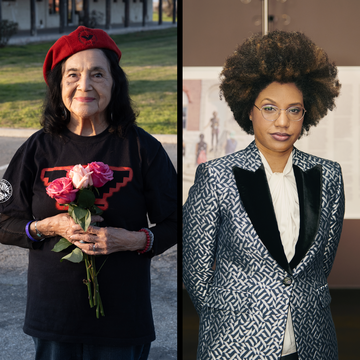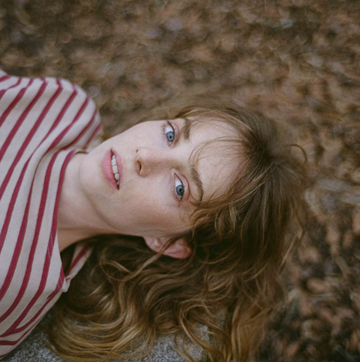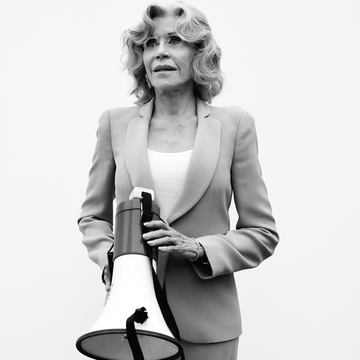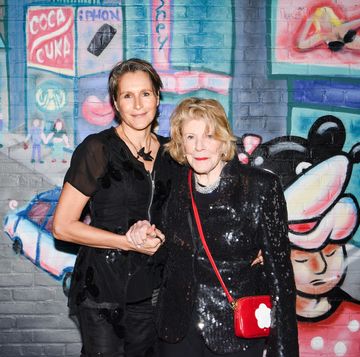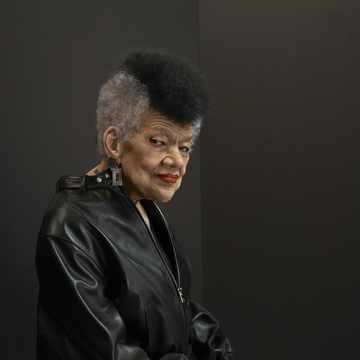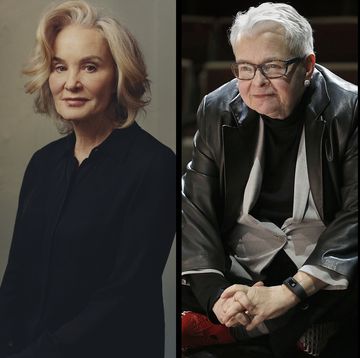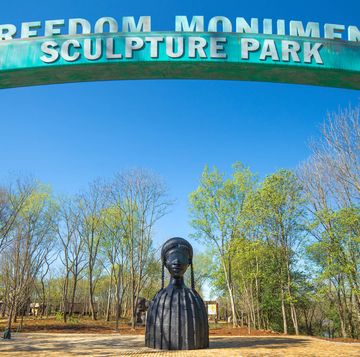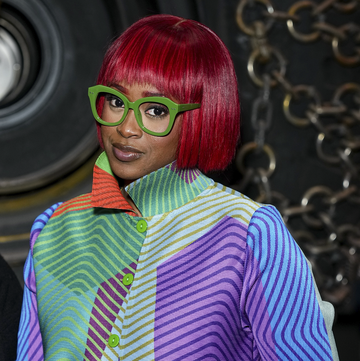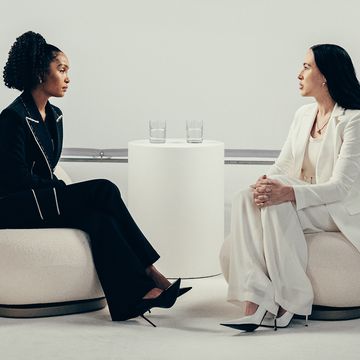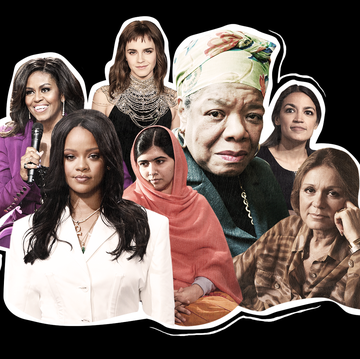It may come as no surprise that Rashida Jones, whose choices over her two-decade-plus career have earned her a reputation as a cerebral presence in Hollywood, has not been coping with the pandemic by watching Selling Sunset or doing the TikTok wine challenge. “I’m trying to pick up some life skills along the way, like patience, gratitude, and meditation, and use this time to cook and be a little bit better of a human being,” says the 44-year-old actor, writer, and producer, who appears on our Zoom call in tortoiseshell blue-light glasses and gold hoop earrings as she recounts how she’s spent the past few months. She’s taken a music theory class online. She’s been reading the philosopher Hannah Arendt and listening to the true-crime podcast To Live and Die in LA, dancing to prerecorded classes (“It feels a little silly to dance alone with no mirror and no guidance, but I still do it”), and following elections up and down the ballot that would “give actual political power to Black women.” Jones has also been watching Michaela Coel’s HBO series, I May Destroy You. “One of the most incredible things I’ve ever seen. It’s so good and complex, and feels like life, in the way that you’re not immune to laughing, or crying, or feeling deeply disturbed.”
Isn’t that the spectrum on which we all exist right now? It has made some days challenging, Jones admits; she is regularly struck by fear, and aching with love. “These past couple of years have been so formative and emotionally shocking in every way, because I lost my mom and I became a mom within eight months,” she says. In August 2018, Jones welcomed a son, Isaiah, with her partner, Vampire Weekend singer and guitarist Ezra Koenig. The following May, her mother, actress Peggy Lipton, succumbed to cancer. “I thought I would reach some sort of stasis in my mid-40s and just kind of ride it out. But my heart has cracked open in so many ways that I just never expected. There’s so much more emotion and color to life, and my perspective is completely different. My heart’s just big, big, big, and it’s a hard time for that to happen, because there are so many people who need empathy and help in the world. I’ve had to find ways to reel it in, because watching people suffer is so hard. And we’re constantly clocking it because we’re at home. I have to practice being of service in a way that feels meaningful, where I won’t just feel like my heart’s being broken every day.” Jones has never had a one-track career, balancing comedic roles on network shows such as Parks and Recreation and Angie Tribeca with more varied behind-the-scenes work like writing an episode of Black Mirror, executive-producing the TNT series Claws, and working on the screenplay for Toy Story 4 (the last of which she walked away from over concerns about representation at Pixar). She has also taken on more personal projects like Hot Girls Wanted, a 2015 Emmy-nominated Netflix documentary about porn that she coproduced.
Jones ultimately believes that her strongest suit professionally is her decision-making. “I think if I’ve done one thing in my life, it’s that I choose well,” she offers. “That I’m smart to be around people who are better than me.”
It was that instinct that led her to her latest movie, the Sofia Coppola film On the Rocks, which costars Bill Murray and premieres on Apple TV+ in October. Jones was in the throes of new motherhood and mourning when she started the project, in which she and Murray play a father and daughter who embark on a New York caper to root out whether her husband, portrayed by a magnetic Marlon Wayans, is cheating on her. Jones’s character, an uninspired writer and exhausted mother, is vulnerable to the paranoias and the dated wisdom of her playboy father. Coppola says the themes of parenthood and identity that the film explores were inspired in part by her own experience of trying to reacclimate herself with the rhythm of working after having her children. “I was thinking about the men of my father’s generation and the women of my generation, and the clash of how we were raised. And looking at the moment when I started to think about having young kids and trying to get back to work, and the identity crisis you go through in that transition.” Jones related. “Women of a certain generation have been sold a little bit of a lie that they can have it all, and I bought into that,” she says. “There’s a malaise and a difficulty understanding who she is in her own life,” she explains of her character. “What is she here for, who does she live for, what does she wake up for? And where does her self-esteem come from? I think a lot of women struggle with that.”
Jones and Coppola met in the early 2000s, when the director was workshopping her 2003 film, Lost in Translation, with an acting class, with Jones reading what would become Scarlett Johansson’s role. When Coppola directed Jones and Murray in A Very Murray Christmas in 2015, she noticed their chemistry. “For On the Rocks, Rashida has to be the straight man, which is harder,” Coppola says. “We know her from broader comedic roles, and she has a thoughtful, deep side that we haven’t really seen in films. And it was a big help to me that she understood that dynamic of having a bigger-than-life father.”
The outsize legacies of Jones’s and Coppola’s fathers—legendary producer Quincy Jones and director Francis Ford Coppola, respectively—is something they have in common. “My dad is a lover of life and music and people and women,” says Jones, who co-wrote and -directed a 2018 documentary about her father, Quincy. “And he was born in 1933,” she adds bluntly. “I try not to do too much correcting because he’s so sweet and he loves life and ladies, so, yes, there is that side of him. But I also feel protective of him because I know his heart and his intention. At a time when intention and context seem to be taking the backest back seat, I think it’s an interesting thing to explore in the movie. What do you do with this entire generation that’s never going to come around to understanding identity politics in the way that people are understanding them now?”
On the Rocks also pulls apart the facets of being a parent, a daughter, and a wife—a maze of obligations that crystallized for Jones when she started her own family. “It took me a long time to separate my identity from my parents. It didn’t really happen to me until my 30s, because I love them so much, they’re so cool, and I didn’t want to be separate from them. But there’s a natural order where you absolutely have to do that to be a person in the world—and really to be a parent. It’s biological: I have to protect this thing that I created,” she continues. “As protective as I feel about my parents, I have to let go of that for them so I can have it for myself.”
There is an intellectual distance Jones seems capable of putting between herself and the public perception that feels both sane and superhuman. “She understands her place in the entertainment tableau more than most people understand their place in life,” says Kenya Barris, creator and star of the Netflix series #blackAF, which is based on his own life and costars Jones as his wife. “My joke to her is that she’s the Thriller heiress. Her dad’s arguably the best producer in history; her mom was a star. And she grew up on the biggest stage possible. So there’s a notion of her being a person who saw the outside world, decided to go to Harvard, then came back to Hollywood. She’s been very intentioned about the things that she’s done.”
Barris was struck by Jones’s “Zen, monk-like” perspective around the heated Twitter discourse that ensued when #blackAF premiered in April and people questioned the casting of a light-skinned Black woman for the role (Barris’s real-life wife is biracial). “Luckily, I’m in my 40s and I’ve lived in this body my whole life, and I’m fully aware that what I look like doesn’t always translate for people who don’t know me,” Jones says. “And I’m lucky that I’m at a point in my life where that doesn’t feel like my problem anymore. There’s nothing I can do—this is my stupid, fine, straight hair that I don’t even like,” she says, pulling on a strand of it and laughing. “I have five sisters, and I’m the only one with this hair, so I’ve always had shame and weirdness about that.” Jones also saw the conversation through a philosophical lens. “I thought it was interesting because we did want to start the conversation about who’s entitled to Blackness,” she says. “I wouldn’t say I feel entitled to it, but I’m Black. My father is Black. I’ve never had issues with my own Blackness. But I’m also aware of the fact that representation favors European features, and there isn’t representation on the spectrum of being Black; I’m sensitive to it, and I don’t agree with it. I would never want anyone to feel bad about their Blackness because of the way I look.” Ironically, for all the noise, it’s perhaps the role that has felt most authentic to Jones. “I’d like to be the full expression of myself, and in some weird way, this show, this character, is a version that I’ve never gotten to play before.”
If I have more questions for her, whom should I get in touch with? I ask. “Oh, I’ll probably just be here on Zoom whenever you want to talk to me,” Jones deadpans. It’s sort of true. Now she’s writing, producing, and even lending her voice to the animated series Duncanville from home, the diversity of her skill set blessing high-speed Internet everywhere. She doesn’t think in terms of these outputs lately, however, but of Isaiah’s growth. “He doesn’t know from a pandemic, you know? It’s wild because he’s the one marker of time,” she says, smiling. “He’ll not know a word—and then he’ll know it a day later, and you’re like, ‘Oh, right! Things are changing.’ There’s so much more that I really get now—about my mom, about the world.”
Hair: Marilee Albin at the Serrano Salon, L.A., for Davines, and Jamie Greenberg; Makeup: Jamie Greenberg for Dior Beauty.






